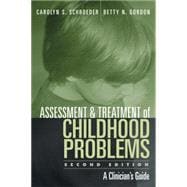This popular book guides clinicians and students in assessing and treating common childhood problems. Written in a highly accessible style, the volume presents an overview of healthy development, examines risk and protective factors for psychopathology, and spells out a behaviorally oriented model of assessment and treatment planning for children aged 2-12. Each problem-focused chapter reviews the literature on the topic at hand and provides step-by-step guidelines for practice, illustrated with helpful case examples. Featuring appendices that describe widely used assessment instruments, the book also contains more than 20 reproducible measures, clinical forms, and parent handouts, ready to photocopy and use.








